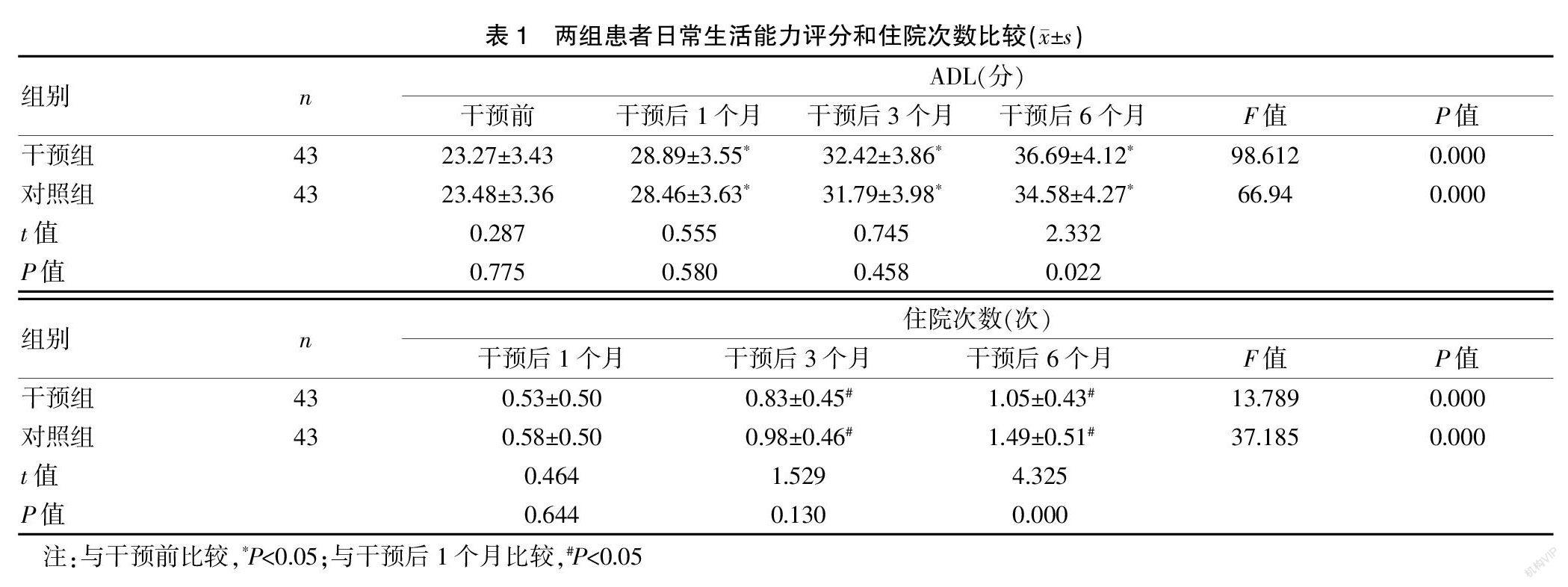互联网对阿尔茨海默症家庭照顾者居家照护知信行的影响
刘桂林 林清然 黄瑞英 张妮



[摘要] 目的 探討互联网对阿尔茨海默症(AD)家庭照顾者居家照护知信行的影响。 方法 采用方便抽样的方法,将2019年7—12月在广州某三甲医院就诊且诊断为AD的86例患者的家庭照顾者,随机分为干预组和对照组。两组家庭照顾者均接受常规护理及健康指导,干预组利用“互联网+”随访及信息咨询平台——“医患通”平台、微信公众号及小程序、微信群与居家访视等干预措施,对AD家庭照顾者进行“线上+线下”结合式延续性护理,比较两组患者的生活能力、住院次数及家属照顾者的知信行、生活质量、满意度。 结果 干预后1、3个月两组患者的生活能力和住院次数比较,差异均无统计学意义(P>0.05)。干预后6个月,干预组住院次数低于对照组,差异有统计学意义(P<0.05)。干预后1、3、6个月,干预组的ADKS、PAC水平均高于对照组,FCTI水平低于对照组差异有统计学意义(P<0.05)。干预后1、3、6个月,干预组生活质量和满意度高于对照组,差异有统计学意义(P<0.05)。 结论 利用互联网对阿尔茨海默症家庭照顾者进行干预及护理有利于提高其居家照护知信行水平、生活质量和满意度,也有利于其对患者照顾水平的提高。
[关键词] 互联网;阿尔茨海默症;家庭照顾者;知信行
[中图分类号] R473.6 [文献标识码] B [文章编号] 1673-9701(2021)24-0176-04
Influence of Internet on knowledge, belief and behavior of home care in Alzheimer's disease family caregivers
LIU Guilin1 LIN Qingran2 HUANG Ruiying3 ZHANG Ni4
1.University of Chinese Academy of Sciences Shenzhen Hospital (Guangming), Shenzhen 518106, China; 2.Department of Nursing, the First Affiliated Hospital of Ji′nan University, Guangzhou 510630, China; 3.Continuing Nursing Service Center, the First Affiliated Hospital of Ji′nan University, Guangzhou 510630, China; 4.School of Nursing, Ji′nan University, Guangzhou 510630, China
[Abstract] Objective To explore the influence of Internet on the knowledge, belief and behavior of home care in Alzheimer′s disease family caregivers. Methods The family caregivers of 86 patients who were diagnosed with AD in a tertiary hospital in Guangzhou from July 2019 to December 2019 were randomly divided into two groups (the intervention group and the control group),using convenient sampling method. Both groups were given routine nursing and health guidance. The intervention group were given the "Internet +" follow-up and information consultation platform, including "Doctor-Patient" platform, WeChat public account and mini programs, WeChat groups, home visits and other intervention measures, to implement "online+offline" combined continuation care for AD family caregivers. The living ability and number of hospitalizations of patients were compared between the two groups. The knowledge, belief and behavior, quality of life, and satisfaction of family caregivers were also compared. Results There was no significant differences in the living ability and number of hospitalizations between the two groups at 1 month and 3 months after intervention(P>0.05). At 6 months after intervention, the number of hospitalizations in the intervention group was lower than that in the control group, with statistically significant difference(P<0.05). At 1, 3 and 6 months after intervention, the levels of ADKS、PAC in the intervention group were higher than those in the control group, the levels of FCTI were lower than the control group with statistically significant differences(P<0.05). At 1, 3 and 6 months after intervention, the quality of life and satisfaction of the intervention group were higher than those of the control group, with statistically significant differences(P<0.05). Conclusion The application of Internet to intervene and care for Alzheimer′s disease family caregivers is beneficial to improve their knowledge, belief and behavior of home care,quality of life and satisfaction,as well as to improve the level of care for patients.

